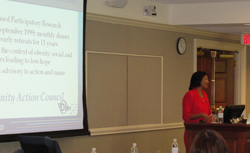 Researchers from around the country gathered in Chapel Hill last week to learn about ways to shrink the gap between health research findings and what is practiced in health care settings.
Researchers from around the country gathered in Chapel Hill last week to learn about ways to shrink the gap between health research findings and what is practiced in health care settings.
The Training Institute for Dissemination and Implementation Research in Health (TIDIRH) is a new 5-day workshop that provides participating researcher with enhanced skills, resources and strategies to conduct dissemination and implementation research in health. The UNC Center for Health Promotion and Disease Prevention (HPDP) hosted the first TIDIRH at the Rizzo Conference Center in Chapel Hill August 1st through August 5th. The Office of Behavioral and Social Sciences Research (OBSSR), National Institutes of Health (NIH), in collaboration with the National Cancer Institute (NCI), the National Institute of Mental Health (NIMH), and the U.S. Department of Veterans Affairs sponsor the TIDIRH.
TIDIRH focuses on connecting the gap between research and practice by increasing researchers’ abilities to conduct dissemination and implementation research. Dissemination research is the systematic study of processes and factors that lead to widespread use of an evidence-based intervention. Implementation research seeks to understand the impact of the processes and factors that are associated with successfully integrating an evidence-based intervention in a particular setting, such as a school worksite.
The 34 TIDIRH participants are all relatively new to the field of dissemination and implementation research, although some have had successful health research careers conducting studies that encompassed some aspects of dissemination or implementation. Participants applied to be accepted into the program, and travel costs and expenses are covered by the sponsors. Lori Carter-Edwards, the deputy director for research and operations at HPDP, was a training participant and found it to be incredibly useful for her research.
”The training provided us with an abundance of useful information, from theoretical frameworks to examples of high-quality, rigorous dissemination and implementation research studies in the field,” said Carter-Edwards. “Just as important, we had the opportunity to engage with the training program faculty who are leaders in this emerging field, and begin building networks with a cohort of colleagues with similar research interests.”
Several faculty and staff from HPDP and the UNC Gillings School of Global Public Health served as instructors for the institute. Barbara Rimer, dean of the public health school, welcomed participants to North Carolina on the first day. Alice Ammerman, UNC professor of nutrition and director of HPDP, served on the core faculty and opened the Institute with remarks and closed the week with charges and next steps.
Carmen Samuel-Hodge, also a UNC nutrition professor, discussed how Weight-Wise, a program developed through her research that has shown significant weight loss for participants, had been implemented in local health departments. Samuel-Hodge received grant funding to study the implementation of the program and found that the program got very similar results when conducted by trained health department staff as when conducted by the research team.

Marci Campbell, also a UNC professor of nutrition and the principal investigator of the HOPE projects at HPDP, discussed how community-based participatory research can guide translation and dissemination. Campbell and Barbara Harris, a HOPE projects community partner, presented an overview of the nearly 18-year partnership between the HOPE project team and women in eastern North Carolina. This dynamic relationship has built and implemented multiple projects that have improved research and benefited the communities served.
Originating in 1993 as Health Works for Women, the project is now called Seeds of HOPE and is studying how support groups can help women achieve their health, financial and happiness goals. Through consultant with a Community Action Council, the project branched into a microenterprise based in the community and received funding from the American Recovery and Reinvestment Act to help women achieve financial goals through matching funds.
“We would never be here without the community,” said Campbell. “It all came from the community. All we did was listen.”
Kristen Hasmiller Lich, Joseph P. Morrissey and Bryan Weiner, all of the department of Health Policy and Management at the UNG Gillings School of Global Public Health, as well as Jennifer Leeman, assistant professor in the UNC School of Nursing and Timothy Carey, director of the Cecil G. Sheps Center for Health Services Research, all served on the faculty. Weiner discussed implementation science from an organizational perspective. Leeman lectured on building the evidence base for dissemination and implementation research. Carey discussed comparative effectiveness research. Lich and Morrissey taught a session on system dynamics tools for dissemination and implementation.
Participants are required to share what they have learned from the training, to help disseminate the skills to others interested in this type of research. They are also required to use the skills to submit grant proposals in this area. The participants and the conveners and faculty will attend an annual meeting beginning next year to continue to network and share their progress in this important and exciting area of research.
The conveners chose HPDP to host because of the facilities and the experience of UNC in conducting this type of research. TIDIRH will be hosted annually at different locations across the country.
